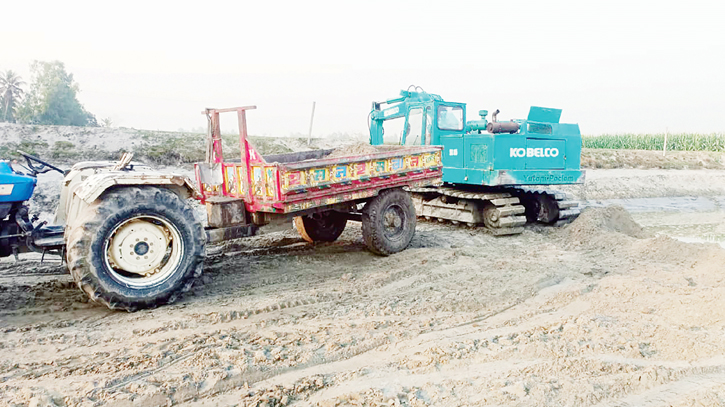
A group of influential individuals recklessly excavating soil from three-crop agricultural lands in Dimla Upazila of Nilphamari. Photo: messenger
Illegal sand and soil mining, under the guise of pond excavation, is wreaking havoc on fertile agricultural land in Dimla Upazila of Nilphamari. Despite clear regulations in place, influential landowners and excavator owners continue to flout laws, causing irreparable damage to three-crop farmland.
The Sand and Soil Management Act 2010 and the Agricultural Land Protection and Utilization Act-2016 clearly prohibit the extraction of sand and soil from agricultural land for commercial purposes. Violators of these laws face hefty fines and imprisonment, yet the illegal activities persist unabated.
Recent inspections across various unions within the upazila have revealed a group of influential individuals recklessly excavating soil from three-crop agricultural land, haphazardly digging ponds, and dredging sand up to 20-25 feet deep from existing ponds' bottoms. The transportation of this sand, often by tractor, has led to the degradation of paved roads, rural pathways, and arable land, posing a significant challenge to the local administration.
Local residents, bearing witness to the environmental degradation and road damage caused by this illicit activity, have raised concerns about the escalating costs incurred by the government to repair the ailing infrastructure. Moreover, the disruption to daily life and transportation networks has compounded the plight of residents across all strata of society.
Rakibul Hasan from Chowdhurypara village highlighted the growing trend of pond excavation due to the profitability of fish farming, a practice prevalent in nearly every union of the upazila, encroaching upon essential agricultural land.
Despite regulations requiring permission from relevant authorities for pond excavation, many landowners proceed without authorization, citing personal convenience and collaboration with excavator owners. Tractor drivers and contractors admit to operating illegally, exploiting loopholes in enforcement.
Residents also raise concerns about the clandestine removal of sand from newly excavated ponds, highlighting the complicity of scavenger owners and contractors. The illicit trade in soil and sand, fetching substantial profits, perpetuates environmental degradation and undermines community well-being
.Responding to these reports, Dimla Police Station Officer-in-Charge (OC) Debashish Kumar Roy vowed to take legal action upon receiving specific complaints, while Dimla Upazila Assistant Commissioner (Land) Farzana Akhtar underscored the gravity of the situation, stating that stringent measures would be taken against any commercial sand mining in contravention of established regulations. Several individuals have already faced fines through mobile court interventions in a bid to curb this illicit activity.
Efforts are underway to address the issue through targeted interventions and mobile court fines. However, the persistence of illegal sand and soil mining underscores the urgent need for comprehensive strategies to safeguard agricultural land and natural resources from exploitation.
As the authorities vow to crack down on violators, the community remains vigilant, advocating for sustainable practices that protect the environment and preserve the livelihoods of farmers and rural communities. Only through concerted efforts can the rampant destruction of agricultural land be halted, ensuring a sustainable future for Nilphamari and its residents.
The unabated exploitation of natural resources for personal gain not only undermines environmental sustainability but also jeopardizes agricultural productivity and community well-being. Immediate intervention from regulatory authorities is imperative to curb these illicit practices and uphold the integrity of environmental and land use laws.
Messenger/Fardin








